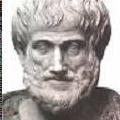Characters: Kelsey, Aristotle K: Um, I'm sorry to bother you but... A: Hm? K: I said sorry to bother you but I'm wondering if you've seen something of mine. A: And what's that? K: Um... My cat. I'm afraid she's missing and I'm becoming quite upset about it. A: I see. What does this cat look like?
K: White with orange stripes.
A: A white cat with orange stripes? Give me a moment to think... No, sorry to say I haven't seen anything like that. I hope you do manage to find her, though.
K: Yes...thank you, very much.
A: Are you alright? You look rather troubled.
K: No, no, I'm fine, thank you. ...Well, no, actually, I suppose I'm not alright. A: What's the matter? K: Well, you see, I know this sounds silly, but I really love my cat, and right now I'm rather afraid I won't see her again. A: Now don't trouble yourself so much. I'm sure it'll come back to you. K: But that isn't all. I also talked with a couple of people before meeting you, and they've both made me reconsider my reasons for looking for her. A: You mean, your cat?
K: Yeah.
A: Who were these people? What did they say to you to make you change your mind?
K: Well... The first man asked me what a cat is . Isn't that an absurd question? Everyone knows what a cat is! But in any case, I couldn't answer him. I tried my best, but I couldn't even tell him what a cat was without comparing it to something else. A: Mm, that is a problem.
K: Yes... And next, I encountered another man an hour later who wanted to know if my cat was perfect. But it was as difficult for me to answer his question. He then said that the only perfect things are the "original ideas" of things. I don't really understand what he meant by that, but he told me that my cat couldn't be perfect. He said it was just a regular cat and that I should stop looking for it.
A: Yes, I see now.
K: It's ridiculous! I'm just trying to find my cat, but these two men have made me wonder why. And now I'm just confused! Perhaps they're right. If my cat isn't perfect and I don't even know what a cat really is, then maybe I should stop looking for her. What do you think about all of this?
A: Well, first, I think the first man you talked to was a man named Socrates, because he often asks questions like that. And the second man was probably Plato, another difficult man to talk with at times. I'm certain in fact that it was Plato. K: Why's that? A: Because Plato was my teacher, and he used to tell me the same things he has told you.
K: Your teacher?
A: That's right. But let me tell you, young man, that I think that both Socrates and Plato were rather mistaken in their ideas.
K: Really? They're mistaken? How so?
A: You see, Socrates believes that no person can ever really know anything, and so it is in fact nearly impossible to answer his questions at all.
K: No one can know anything?
A: Socrates understands that a person must doubt what he thinks he knows. If we cannot doubt what we believe we know, then we cannot be careful to avoid mistakes we make in our assumptions.
K: Interesting... A: Now, Plato is another matter. To understand Plato, you must understand that everything changes. That is, all things in this world change.
K: Well, sure, I can imagine that. That's easy. A: But why then do shapes and forms still remain constant among things and over time? For example, why do all cats look mostly the same? They all usually have four legs, two eyes, fur... But at the same time, all cats are also a little different, and if I gave you a new cat, it still wouldn't be exactly the same as your cat. K: Yes... A: But Plato is missing the point. All things have a history and change over time . To really know something, you must understand it's history, as well as what it's made of, how it works, and it's purpose. K: It's history? You mean, to really know my cat, I have to understand its history? Like, its past?
A: Yes, in part anyway.
K: And if I know my cat, I might also know what she likes to do, like biting people. ...And I might also understand where she wants to go! Maybe I can find her if I know her past!
A: Er, yes, perhaps, but how do you-- K: This is great! I just have to go back to the past and look for my cat there! Thank you so much!
A: W-wait, I didn't mean-- K: I have to go! Goodbye!
Now listen to the questions. If you don't understand something, ask either Kelsey or your tutor for help. Send your answers to Kelsey in the Writing Section at LingQ or tell Kelsey your answers in a conversation with him in the Speaking Section. You don't have to answer all the questions. Good luck!

